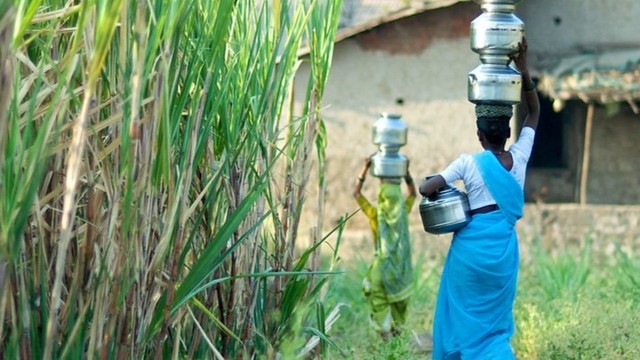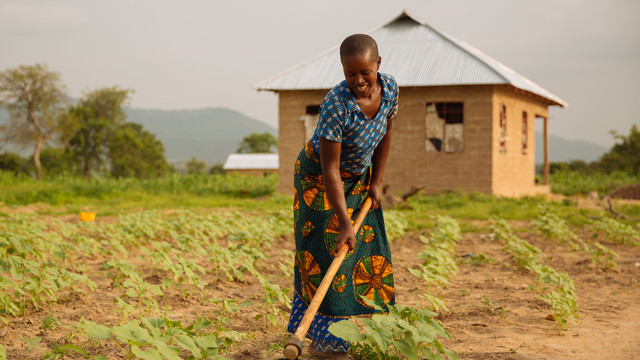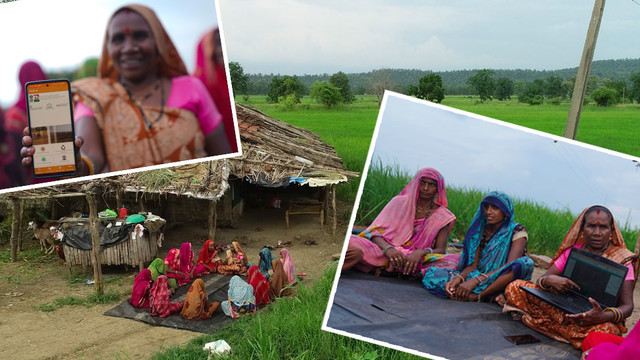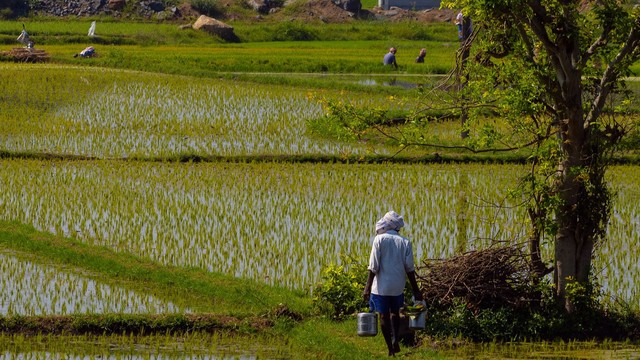Prema Gopalan remembered
IIED partners and staff pay tribute to an inspirational leader and fighter for rural women’s rights and entitlements in India and worldwide.

Prema Gopalan at the India Social Entrepreneur of the Year 2015 award ceremony, where she was a finalist (Photo: World Economic Forum/Benedikt von Loebell, via Flickr, CC BY-NC-SA 2.0)
Prema Gopalan co-founded the Society for the Promotion of Area Resource Centers (SPARC) with Sheela Patel in 1984. One of the largest NGOs in India, it works with the urban poor on issues such as housing and sanitation. In 1993 she started Swayam Shikshan Prayog (SSP), which supports networks of grassroots women entrepreneurs, and was executive director for over 20 years.
This is just the beginning of many tributes to Prema, who died on 29 March, aged 66. Below, Sheela Patel, Clare Shakya and Karen Wong share their memories of Gopalan and of working with Swayam Shikshan Prayog. Many others have sent letters or audio video reflections and shared stories, paying tribute to the legacy she leaves.
Sheela Patel, founder and director of the Society for the Promotion of Area Resource Centres (SPARC):
Prema demonstrated a two-way pathway between disaster and development informed by a climate lens, seeing the way that climate change impacts women in particular.
Prema was a co-founder of SPARC and began working with poor urban women. She explored the potential for networking with women’s groups to define issues to collaborate on with poor landless or marginal farmers and the NGOs that worked with them.
After the massive earthquake that destroyed the Latur and Osmanabad districts of Maharashtra in India, work that began on livelihoods and land quickly moved to disaster relief and reconstruction.
Here Prema’s unique journey began. She challenged the strategy of the World Bank and the top-down plans of the government of Maharashtra, by producing a unique women-driven, community-led assessment and retrofitting 900 villages in these districts.
This led the way towards a development process that helped women’s networks to form a social movement that embraced capacity building, resilience building and development programmes. These women’s collectives travelled within India and globally to assist other woman’s networks to address both immediate disaster-linked crisis and long-term transformation as part of the Huairou Commission.
More recently, she worked with 60,000 women working as marginal farmers and compelled to grow cash crops and beg for their families. This was in drought-prone areas with high suicide rates for farmers caused by debt for loans for pesticides and chemical fertilisers. She gave these women land to farm using sustainable and scientific techniques to produce organic food and sell surplus in the market.
Today Prema, SAPS and the Sakhi Network have national and global recognition for their own transformation and the scalable solutions they have initiated. Prema has left us but her spirit lives in each and every one of her peers, friends and the Sakhi Network, committed to support and expand the powerful process that she began.
On 10 April 2022, Swayam Shikshan Prayog organised a memorial service to honour the memory of Prema Gopalan. Hundreds of grassroots women, known as Sakhis, gathered in Latur and pledged to carry forward her vision
Clare Shakya, director of IIED's Climate Change research group:
I remember the first time I met Prema; we were gathering a range of actors to discuss what effective adaptation could look like from different perspectives.
Prema spoke so eloquently about how women are managing so many different shocks at any one time, through organising collective approaches. And that by organising, women are also able to increase their resilience, by working together to grow their economic power - by transporting and selling products together.
Governing their own organisations and leading their own processes also builds their political capabilities, increasing their confidence in influencing local and national government policies and interventions to better support their resilience.
Prema reframed the top-down technocratic world that climate thinking was caught up in 10 or so years ago, and connected processes of power and voice in such a clear and compelling way that we were able to build the idea of a very different way of working. It was almost the creation of a new philosophy, and I am sure all those who were part of those discussions still hold those meetings dear, and Prema’s role in them close to their hearts.
We agreed that understanding the effectiveness of adaptation interventions could not be a neutral technical assessment, but rather one where different stakeholders would have very different perspectives, and that only by bringing these views together can we truly understand where the synergies lie and what are acceptable ways of resolving trade offs.
The ‘magic happens’ when all voices count and are heard. We will miss Prema’s clear-sighted vision and strongly held values.
Karen Wong Pérez, senior researcher, IIED's Climate Change research group:
I first met Prema at the 13th International Conference on Community-based Adaptation. She was one of the keynote speakers and I thought she was an inspiring, powerful woman. One of Prema's powers was the eloquence with which she could create a clear vision in the minds of others that there was a different way of doing things. A more egalitarian, fairer way.
Prema had the ability to, through the cadence of her words, give the audience a new lens through which to see the world. Through these 'lenses' created by Prema's paused and eloquent voice, one could clearly see a world where poor women who are not usually considered farmers were not only farmers but were seen as agriculture decision-makers, as planners and experts in local adaptation.
And this spell spills over to their farmers, communities, and beyond. So, they are then able to leverage funds from the government and banks, and to tackle the climate and other risks faced by their communities. And in turn, this builds sustainable community networks that work in collaboration with the government and other actors.
The profoundly transformational vision was not only an idea. She set her vision in motion, advancing transformations from the individual to the system level in India and beyond.
If leadership is the ability to create the conditions for people to empower themselves, Prema was the greatest leader of all. One of the qualities of the 'lenses' that Prema lent us to see the world is that they settle on you forever, and you learn to see that such a world, egalitarian and just, is possible with effort, collective action, and humility.



